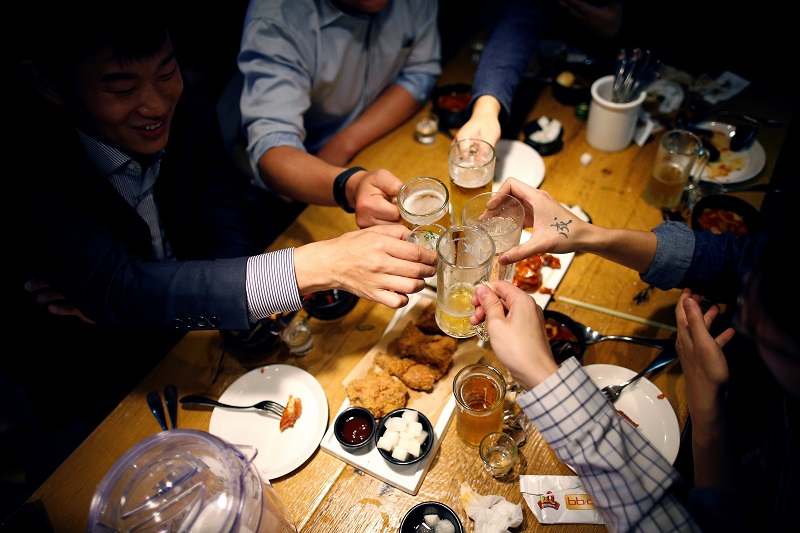
People make a toast at a pub in Seoul, South Korea, October 11, 2016.
16:03 JST, April 28, 2022
SEOUL (Reuters) – When South Korea announced its decision to lift most COVID-19 restrictions earlier this month, 29-year-old office worker Jang was more concerned than happy.
The end of social distancing revived the time-honored office ritual of after-work meal gatherings, part of a tradition called “hoeshik” in Korean. Jang was among the increasing number of young workers here who consider it an obsolete company culture that intrudes on employees’ personal time.
“Hoeshik is part of your work life, except it’s unpaid,” said Jang, who lives and works in Seoul. She asked to be identified only by her last name in order to speak candidly about her employer.
Beginning last week, South Korea removed a midnight curfew on bars and restaurants, along with a cap of 10 people for private gatherings. The rules had served as guidelines for companies to adopt remote work policy and rein in non-essential gatherings, such as the off-hours drinking sessions.
“The worst part about the after-work dinners is that you don’t know when it’ll end. With drinks, it could really continue well into the night until who knows when,” Jang said.
Even before the pandemic, an increasing number of South Koreans, particularly younger workers, were already souring on company dinners and similar events, such as company retreats or weekend hiking with co-workers.
The pandemic may ensure that the old hoeshik culture is fading for good, an expert said.
“Now that employees know what it’s like to have off-hours kept for themselves, companies won’t be able to fully restore the old after-dinner and weekend gathering culture,” Suh Yong-gu, a marketing professor at Sookmyung Women’s University in Seoul, said.
According to a recent survey by Incruit Corp, a recruiting website operator, nearly 80% of respondents said their companies’ meal-gathering culture had changed during the pandemic, with 95% of them expressing satisfaction over the change.
The past two years taught Jang what hoeshik-free evenings were like. She spent more time to keep her house clean, make herself a good dinner and work out.
Kim Woon-bong, 30, who began working for a city government last year, said he felt lucky not having had to go through the mandatory hoeshik culture, thanks to the distancing rules.
“I actually liked meal gatherings held during lunch hours, because I knew they would end at 1 p.m.,” he said. “I am cautiously hoping the company dinner culture will change now that it has been almost gone for two years.”
Despite young employees’ growing displeasure with after-work dinners, many senior workers still believe such gatherings are necessary to build bonds with colleagues, Professor Suh said.
“It will be yet another conflict between the old and new generation,” he said. “But even if the after-dinner and weekend-gathering culture manages to survive, they won’t be able to be held as often as they used to be.”
While many companies are gradually returning to their offices, some are seeking to find a middle ground, opting for hybrid models instead of implementing a full-fledge return-to-office scheme.
SK Telecom Co Ltd 017670.KS, for one, is operating new workspaces to allow its employees to choose whether to work from home, at their head office, or at small dispersed work spaces that the company has opened.
“We don’t have specific guidance on company dinners, but they will be less frequent when many of our employees are working from home,” a company official said, asking not to be named as he was not authorized to talk to media.
“The key is that we don’t mind where our employees work or how often they come to the office, as long as it helps improve their efficiency.”
Top Articles in News Services
-

Prudential Life Expected to Face Inspection over Fraud
-

Hong Kong Ex-Publisher Jimmy Lai’s Sentence Raises International Outcry as China Defends It
-

Japan’s Nikkei Stock Average Touches 58,000 as Yen, Jgbs Rally on Election Fallout (UPDATE 1)
-

Trump Names Former Federal Reserve Governor Warsh as the Next Fed Chair, Replacing Powell
-

Suzuki Overtakes Nissan as Japan’s Third‑Largest Automaker in 2025
JN ACCESS RANKING
-

Japan Institute to Use Domestic Commercial Optical Lattice Clock to Set Japan Standard Time
-

Israeli Ambassador to Japan Speaks about Japan’s Role in the Reconstruction of Gaza
-

Man Infected with Measles May Have Come in Contact with Many People in Tokyo, Went to Store, Restaurant Around When Symptoms Emerged
-

Prudential Life Insurance Plans to Fully Compensate for Damages Caused by Fraudulent Actions Without Waiting for Third-Party Committee Review
-

Woman with Measles Visited Hospital in Tokyo Multiple Times Before Being Diagnosed with Disease
























